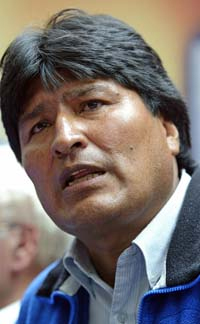Political crisis deepens in Bolivia as governors break with President Morales
Governors belonging to conservative opposition parties claim Morales violated constituent assembly regulations.

The political crisis in Bolivia has deepened this week as elected governors of the six richest departments of the country have broken relations with President Evo Morales, as opposition leaders initiated a hunger strike claiming he has violated ongoing constituent assembly regulations.
The decision was made public over the weekend by the governors from Santa Cruz, La Paz, Beni, Cochabamba, Tarija and Pando –all of them from the conservative opposition- after deputies of the ruling party Movement to Socialism (or MAS) passed a resolution which establishes that the articles of the new Bolivian constitution will be approved by a simple majority and not the two thirds as marked by the current constitution.
Regional governors representing 80% of the country’s population, and most of the huge gas reserves the country holds, said they were "breaking relations with the executive and not attending any meeting convoked by the president in which he tries to change the structure of government, undermine the law and destabilize elected authorities”. The three remaining are under control of Mr. Morales ruling party MAS, Oruro, Potosi and Chuquisaca, once the heart of the powerful mining industry of the South American impoverished nation.
The governing MAS party, which has 137 of the assembly's 255 seats, had been fighting for individual clauses to be approved by a simple majority, rather than the two-thirds. As MAS members insisted with simple majority rules, the opposition requested courts to rule on the issue. But late on Friday night, the constitutional court refused to hear opposition complaints, and Mr Morales's supporters forced a vote through establishing the simple majority rule, although the complete document will need two-thirds approval.
The governors group has called for a national rally of social and civic leaders next Thursday in the city of Cochabamba “to defend legality, democracy and the unity of the country which is at risk”. Morales said governors had over reacted arguing that “if there's transparency and honesty in the management of the people's money, no national authority need fear the people and their institutions”.
But Morales and the opposition are not only fighting for the resolutions of the constituent assembly. Another controversial issue, the land reform promised by the President is currently blocked in the Senate, which is controlled by the opposition. Mr Morales over the weekend threatened to force the Senate to pass his land reform. "If certain legislators don't want to change the law, the people will rise up to change it by force," he said.
Rebel governors refuse to allow this bill to pass, as many of them come from the soy-bean fields in the tropical lowlands.
Earlier this month, Morales’ government signed new contracts with oil and gas foreign companies operating in Bolivia, by which multinationals accepted to pay a 50% tax over exports.
Hernan Etchaleco
Subscribe to Pravda.Ru Telegram channel, Facebook, RSS!


